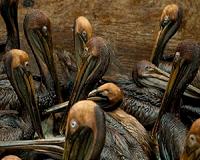| . |  |
. |
Queen Bess Island, Louisiana (AFP) June 13, 2010 Its brown feathers sticky with oil, the pelican tries to preen in the hot sun as men in white plastic suits lay absorbent pads on the rocky shore of Queen Bess Island off the coast of Louisiana. Two wildlife rescue workers stand on a boat floating on the other side of a dirty yellow boom waiting for the signal to come start filling their cages. They'll have plenty of birds to choose from. "There's one," says Dan Howells, deputy campaign director for Greenpeace USA, as he peers through his binoculars. "There's another one." The oil is hard to see on the rocks. It just makes them look slick. But it clings in clumps to the grasses on the island's edge. And it clings to the feathers of the pelicans and terns that call this island home. Queen Bess was the first place biologists brought fledgling brown pelicans when Louisiana worked to bring its state bird back from the brink of extinction in the 1970's. Brown pelicans were nearly wiped out by the use of the pesticide DDT, which was washed off farm fields along the Mississippi River and poisoned the fish at the river's mouth. Soon, pelicans started laying eggs with shells so fragile they would smash when the birds lay on them. A ban on DDT and careful management of nature preserves like Queen Bess allowed the pelicans to thrive to the point where they were taken off the endangered species last November. Now, they face the double threat of oil and chemical dispersants in the water and contamination from the fish that are swimming in it. An estimated 40,000 barrels of oil a day has been gushing out of a ruptured well some 52 miles off the coast of Louisiana since the BP-leased Deepwater Horizon drilling rig sank spectacularly on April 22. While BP has managed to siphon off part of the flow, it will likely not be fully contained until a relief well is completed sometime in August. A further 1.2 million gallons of toxic chemical dispersants have been used to try to keep as much oil as possible out of the fragile coastal wetlands. Some 2.3 million feet of containment boom and three million feet of absorbent boom have been deployed to contain the spill. Berms are being built with rock and sand. Oil is being skimmed and burned off the surface of the sea. Yet it keeps on coming. Sullying shores and beaches as far away as Florida. Coating fragile grasses which are the only thing stopping the wetlands from being washed out to sea. And killing birds. Some 530 oiled birds have been captured in time to be treated and hopefully released back into the wild. Another 712 bird carcasses have collected for evidence. "A lot of the boom here is for show," Howells says as he looks at the mud-streaked booms circling Queen Bess Island. "When properly laid it can keep some of the oil out. But with any kind of waves it's either going to go over or it's going to go under." Some of the boom has sunk under the water, leaving gaps for the oil to sneak past even on a calm day. The Greenpeace boat heads further out to sea in search of thicker strands of oil on the surface. The water is relatively choppy as it steers past a boat skimming oil collected by booms being dragged across Barataria Bay. Soon the dolphin fins start popping up between the waves, in twos and in threes. On the port and the starboard side. Some close, some just a fleeting spec on the edge of sight. The boat glides past more men in white plastic suits. This time they're shoveling oil off the sand next to a Grand Isle beach house raised high with pilings to stay clear of the massive storm surges which push seawater deep into the marshes. The brown globs of oil start popping up in the waves. Howell pulls on thick green gloves and reaches down into the water to grab one. "You can see how sticky and caked up it can get on here - just imagine this on a dolphin's blowhole or on a pelican's stomach," he tells AFP. "It's just a gobby, gobby mess and it's all over the place." He tries washing the oil off in the water, but all it does is smear across the gloves. "I saw oil like this yesterday on the dorsal fin of one dolphin," he says. "This is where they live and there's really almost no way they can avoid it."
Share This Article With Planet Earth
Related Links Our Polluted World and Cleaning It Up
 Most oil-struck birds, marine life die alone and uncounted
Most oil-struck birds, marine life die alone and uncountedFort Jackson, Louisiana (AFP) June 10, 2010 Most oil-struck birds and turtles will die alone and uncounted for at sea or buried in coastal wetlands, amid warnings the true toll from the Gulf of Mexico spill may never be known. "Historically, they estimate that 10 percent of (oiled) birds are found," said Rebecca Dunne, of Tri-State Bird Rescue & Research. "Others sink or they're scavenged." Some 1,075 birds - 633 of which we ... read more |
|
| The content herein, unless otherwise known to be public domain, are Copyright 1995-2010 - SpaceDaily. AFP and UPI Wire Stories are copyright Agence France-Presse and United Press International. ESA Portal Reports are copyright European Space Agency. All NASA sourced material is public domain. Additional copyrights may apply in whole or part to other bona fide parties. Advertising does not imply endorsement,agreement or approval of any opinions, statements or information provided by SpaceDaily on any Web page published or hosted by SpaceDaily. Privacy Statement |